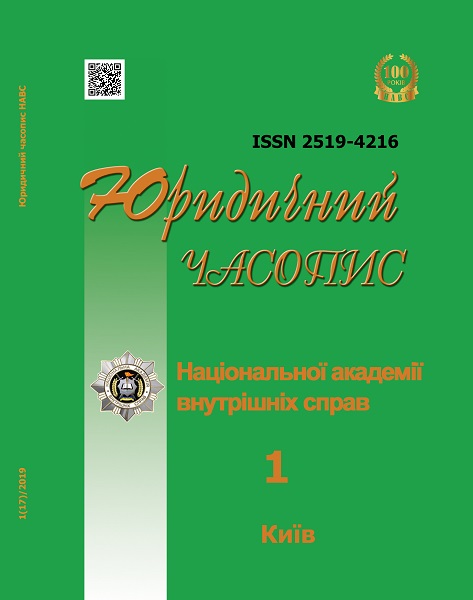Foreign Experience of Legal Counteraction to Illegal Enrichment: Conceptual Foundations
Abstract
The purpose of the article is study the experience of foreign countries in applying various legal instruments counteract illegal enrichment in order to take into account its positive and negative aspects in formulating the conceptual foundations of the Ukrainian model of prosecution of chargeable officials for such a corruption offense. The article apply the concept of scientific methods,as follows: terminological, systemic-structural, formal-logical, comparative-legal. The theoretical basis for the study is the work of foreign scientists, the provisions of the UN Convention against Corruption, the legal norms used to counteract illegal enrichment, as well as the practice of their application in individual countries. The scientific novelty of the article lies in the fact that it discloses the positive and negative spectra the usage two models of legal counteraction to illegal enrichment. These are: 1) recognition of unclear enrichment as the crime and bringing the perpetrators to criminal responsibility; 2) the confiscation of property, the origin of which a person cannot explain, during so-called civil confiscation. In addition, proposals for their effective use in general and in Ukraine in particular are formulated. According to the results of the study, conclusions are drawn: 1) refusal to use the term «illegal enrichment» by replacing it with «unclear enrichment» or «inexplicable enrichment» when designing new instruments to counter illegal enrichment in Ukraine; 2) the identification of such models of legal counteraction to illegal enrichment, which nowadays have become the most widespread in the world: a) recognition of unclear enrichment as the crime and bringing the perpetrators to criminal responsibility; and b) confiscation of property whose origin cannot be explained during so-called civil confiscation; 3) the positive aspects of the use of the said legal instruments, which consist in the fact that they are: a) stimulate persons authorized to perform functions of the state or local self-government, to lawful conduct, primarily to refrain from committing corruption offenses; b) allow to remove illegally acquired assets and turn them into state revenue during the confiscation of property; c) contribute to the reduction of corruption in the state; d) testify to the fact that real steps to counteract corruption are being taken in Ukraine; 4) prospects of using these models in counteracting illegal enrichment in Ukraine.
Keywords: illegal enrichment; unclear wealth; confiscation; corruption; corruption crime; declaration; inaccurate information; organized crime; presumption of innocence; burden of proof.
Downloads
Abstract views: 399 PDF Downloads: 310
Copyright (c) 2019 Law Magazine of the National Academy of Internal Affairs

This work is licensed under a Creative Commons Attribution-NonCommercial-NoDerivatives 4.0 International License.
- Authors reserve the right to authorship of their own work and transfer to the magazine the right of the first publication of this work under the terms of the Creative Commons Attribution License, which allows other persons to freely distribute published work with mandatory reference to authors of the original work and the first publication of an article in this magazine.
- Authors have the right to enter into separate additional agreements on non-exclusive dissemination of the work in the form in which it was published in the journal (for example, to post an article in the institution's repository or to publish as part of a monograph), provided that the link to the first publication of the work in this journal is maintained.
- The journal's policy allows and encourages the posting of articles by authors on the Internet (for example, in electronic storehouses of institutions or on personal websites), both before the submission of this manuscript to the editorial office and during its editorial processing, as this contributes to the creation of a productive scientific discussion and positively affects the efficiency and dynamics of citing the published work.




